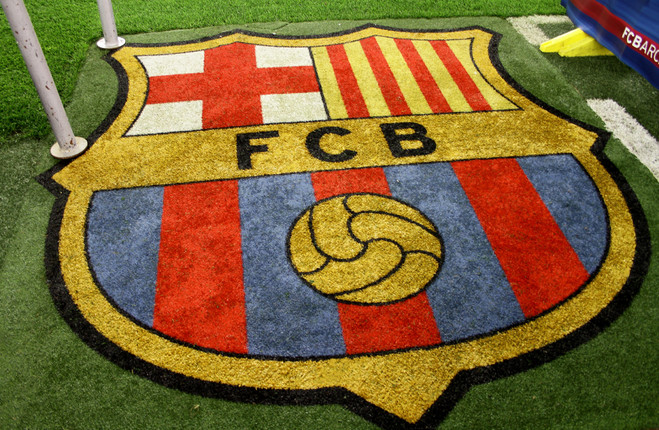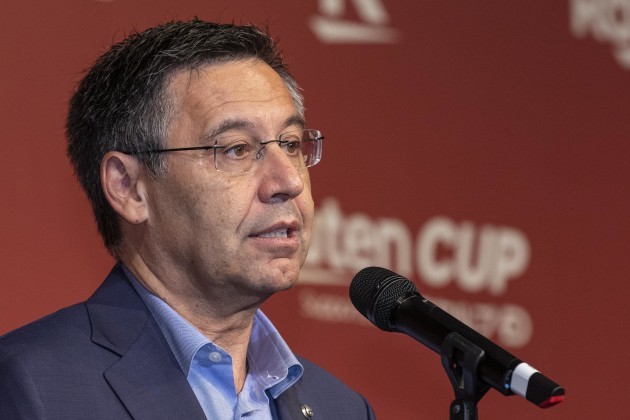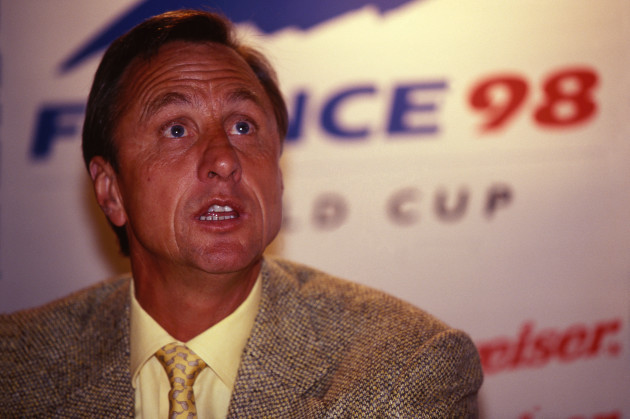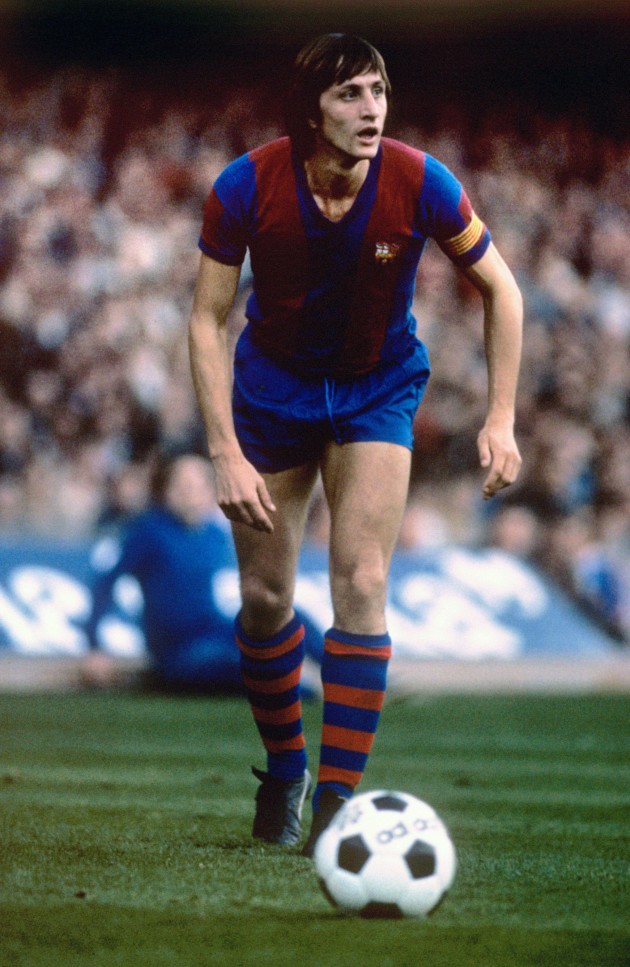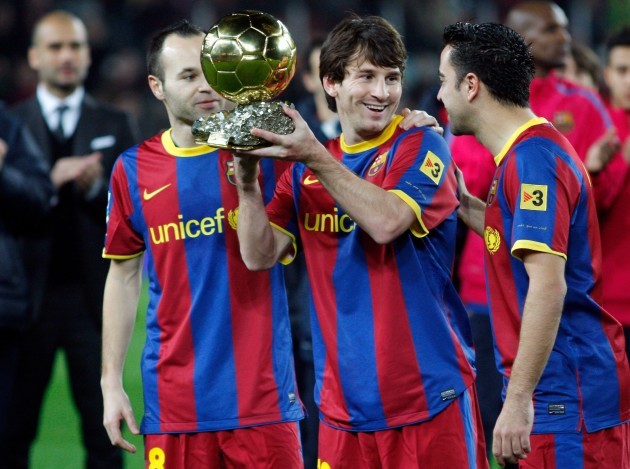BARCELONA WEREN’T always a club that dominated domestically and in Europe, as they did largely for a spectacular 10-year period from 2005 onwards.
Particularly on the European stage, they were often eclipsed by rivals Real Madrid. Los Blancos had already won the European Cup six times by the time Barca lifted the trophy for the first time in 1992, and the Catalan side would proceed to repeat that feat four times within the aforementioned decade.
Really, it was the arrival of Dutch legend Johan Cruyff, initially as a player, that proved the catalyst for their later success.
Cruyff won just two major trophies during five years at Barca as a player — the 1974 La Liga and the 1978 Copa del Rey.
But it was his influence as a coach that inspired the footballing philosophy which the club still attempts to abide by now, helping them win four successive league titles as well as a first European triumph during his eight years as a manager at the Camp Nou.
Simon Kuper initially planned ‘Barca’ primarily as a celebration of the club and the Cruyffian principles that have brought it so much success.
Yet he ultimately discovered the details, now public knowledge, of a team on the brink of a financial crisis and threatening to become a shadow of their former selves.
The42 recently caught up with Kuper to discuss his new book…
What surprised you when researching this book?
I began it in early 2019 and I’ve been visiting the club for decades. What I discovered, which is what we all know, is that it was falling apart. That hadn’t been clear to me from the outside. It was still a world-class operation. They won the Spanish league in 2019. They beat Liverpool in the first leg of the Champions League in late April. So you’d have thought then: who’s the best team in the world, probably Barcelona right? They’re going to get past Liverpool, get to the final, probably beat Ajax or Spurs, achieve another Champions League win with their incredible players.
As I went on, 4-0 at Anfield was another big warning signal for me. For the club as well, they hadn’t realised they were falling apart.
Then everything comes together, the pandemic, the big purchases that never quite pay off, Griezmann, Coutinho, Dembele, and Neymar is lost and never replaced. Messi starts to become very outspoken. So what surprised me most, I walked into a place that I thought was a model and it had been, and I write about that, but it turns out also to be a disaster and I write about that too.
Who is to blame for their current predicament?
There are two individuals that are more culpable than most. One is Jorge Messi. The father, also the agent, of Lionel, who kept coming back for pay rises saying: ‘My son might leave this summer.’ He had a rolling contract, so he could leave every summer without a transfer fee.
With Jorge Messi, he could have thought: ‘My son’s already the best-paid player in the world. I should think a bit like a stakeholder, I should try to make sure the club is healthy and can sign great players to play alongside my son.’ But he thought: ‘I’m going to max out the income.’ Even though it’s not like the Messis live it large and they needed that much money.
By the end, Leo’s earning €125million a year and there’s very little left, so they can’t sign Neymar, who Messi really wanted to bring back. Jorge Messi’s greed was part of the financial issue.
And then the other thing was the president from 2014 to 2020 is Josep Maria Bartomeu, he handled things very badly. He’s a very nice man and helped opened the door for me to write the book. But he liked saying ‘yes’.
Football is a very difficult environment for someone like him, a businessman from a family company [that makes] jet bridges that take passengers from plane to the terminal. Suddenly, in football, you’re dealing with these agents and you’re like a gazelle among lions.
So Bartomeu keeps giving in to Messi’s wage increases, gives everyone else a wage increase and then the transfer fees. Other clubs saw Barcelona coming, knew they had a lot of money and this naive president. So then you get situations like Barcelona paying €150 million for Coutinho, and something similar for Dembele.
Going back to the Barcelona of an earlier period, would you agree with Pep Guardiola’s suggestion that Johan Cruyff is the most important person in football’s history?
I do. And that’s why I wrote a mini-biography of Cruyff into the book. I absolutely do think that. I’m biased because I grew up in Holland, I’m a fan of Dutch football, he was my childhood hero. But I really do think the more I watch modern football, the way to play the best football was invented in Amsterdam East in the ’60s by Cruyff and Rinus Michels. Then they started it in Barcelona and they pioneered it there.
But gradually everyone else did it too. Bayern Munich, Manchester City, Italy at the Euros, it’s very Cruyffian football. You’ve got to keep updating it, but he invented the principles that worked better than catenaccio or traditional British football based on this Brazilian game where everyone stands still and the guy dribbles.
So Cruyff defined the secrets of football. He’s the most important and also the most interesting guy in modern football history.
Does anyone else come close?
I think in every field, the founder is the most interesting because that’s the most original personal. Now we get excited by people like Pep Guardiola and Jurgen Klopp.
And Guardiola is the disciple. He’s taken the best of Cruyff and he’s a more rational and reasonable person than Cruyff. He created a system of 15 passes and the five-second rule, which Cruyff didn’t do. But he’s just a follower and I think Klopp in a way is too, it’s very hard to be anything else. It’s very hard to revolutionise the way a game is played, you don’t get many people who can do that.
What type of personality was Cruyff away from football? Was he interested in books or culture?
Not really. He left school at 12, I think later in life, he learned to read a little, but he felt that he’d learned everything in real life, his school would be in the street. So Guardiola is a much more cultivated man in that way.
But Cruyff had a completely original view on everything and he always assumed that he was right. And he had a very good sense of space.
There’s a famous anecdote of him playing in the US, going to Florida for the first time in his life for a training camp. The team bus gets lost. Cruyff directs the driver to the place they should be because he just feels space.
He was fascinated by a lot of things like surgery, so he would always watch operations, he’d have views on where the traffic lights should be placed. So he always thought he knew best. He’d walk into every situation and say: ‘Everything you are doing is wrong, you ought to do what I say.’ And that was his take on life. As it happened, in football, that was correct. That’s where he derived this enormous self-confidence from, because aged 15, he could see the field in a way that veteran internationals couldn’t.
I’m reminded of his phrase ‘every disadvantage has its advantage’.
Yeah, that’s become a kind of proverb in Dutch.
You could argue the fact that he left school so early helped make him a more independent thinker.
Yeah, it meant that he discovered and learned everything for himself. He didn’t really have any formal education and didn’t believe in coaching courses, he was very snotty about those and never followed one. So he was not impressed by any kind of formal knowledge that other people had acquired.
He never coached a team again after Barcelona. Was it essentially because he wanted to spend more time with his family?
I think he got old early. He smoked. He worked from the age of 17 to 29 and was always in conflict with people, which made the work more stressful.
And he had sort of run out of ideas and was being overtaken. So Milan played a kind of Dutch pressing football, but they did it better and thought more about it. He’d stopped thinking, which happens to a lot of people and is also what happened to Barcelona in the [latter] Messi years. At the top, you get lazy.
People often think that work stress gives you heart problems, which I don’t think is true. But his family thought coaching a club was much too stressful for a man who had a massive bypass operation aged 43. So they were against him taking other jobs.
The other thing is Barcelona is a very seductive place to live and it’s a very hard place to leave. So if you’re in Barcelona and offered a job in Manchester or Dortmund, if you’ve already done everything, it’s not a hugely appealing prospect. And the best life to lead is as a rich person in Barcelona, I would say.
Was he a slightly sad figure towards the end of his life, as he seemed to be almost ostracised from football?
I don’t think he thought he was sad, he just felt he was right and everyone else was wrong, though he had sort of stopped thinking. He kept saying ‘it’s ridiculous having a left footballer playing outside right, a winger should be right-footer on the right, left-footer on the left, even though football had moved on. So he couldn’t really see anything that was different, which happens to a lot of old people I think.
He did find pleasure in family, but he became very sour. When you’re always fighting with people, when you’re on top and the best coach or player, you’re going to win. But as soon as you retire, then people think: ‘Oh God, that guy is impossible. Let’s keep him out of here.’
The famous La Masia academy in Barcelona adopted Cruyff’s philosophy and was ultimately key to developing several world-class players at its peak. What can coaches in Ireland and elsewhere learn from La Masia’s heyday?
I don’t know about the Irish, but certainly, the English did [learn from it]. If you look at the England team at the Euros, it had little guys who could pass and understand space, like Jadon Sancho, Phil Foden and Bukayo Saka. These are not the kind of players that England have historically produced. So I think English academies shifted away from ‘let’s find the big lad’ because when you’re 12, the big lad does best — he bulldozers through tackles, kicks the ball furthest, so he looks good. But then when you’re 18, and playing against people who can play football, and height and weight are less of a consideration, those people are not so impressive anymore.
So I think what Masia taught is how small kids are often better — he has to learn to understand space and how to produce passes quickly because otherwise he’ll be bulldozed by the big lad.
What Cruyff taught, and Barcelona taught, is that the secret of football is to pass. You can spend your life studying it. It’s very complex, it’s about passing diagonally, it’s about ‘when I pass to you, the third man has to already be running into space to receive your pass’.
So there are endless permutations. How do you draw the defender to you the way Sergio Busquets can do, and then pass into space behind him just when he’s on you?
So you can spend your life on it. And that’s really what football is about. It’s about Cruyffball. And if you see teams like Italy and Spain at the Euros, you see what he means.
One La Masia graduate who is one of the key figures in the book is of course Lionel Messi and it was unfortunate in terms of timing that his departure was announced just after you finished writing it. Is it fair to say it’s comparable to United losing Ferguson in terms of the influence he had on the club?
That’s what people at the club would say to me two years ago when they were looking ahead to Messi’s departure.
I think it’s worse because you lose Ferguson and it does seem to have made a big difference, but you still are a very rich club and can buy top-class players. You don’t always buy the right ones but you have the highest wages, the highest transfer fees, but you’re going to be okay in the end.
Barcelona don’t [have significant financial power] anymore, so you’ve lost Messi, but you’ve also lost a lot of your wage bill. So they’re supposed to have a wage bill on a par with Everton or Aston Villa. They’re not quite there yet, because they haven’t quite managed to get rid of all the expensive players, but then you’re going to perform like Everton or Aston Villa as wages predict performance, so I think they’re not going to dine at the top table anymore.
Even if you had a billion dollars, you couldn’t replace Messi. But you’re going to have a team that’s not going to be one of the best teams. Then you’re going to have clubs like Manchester City or Bayern Munich saying: ‘Oh, we like the look of Pedri and we know you’re in financial trouble, so we’re going to make an offer for Pedri.’
What is the best-case scenario for the current Barcelona team looking ahead to the future, and what’s the worst-case scenario?
The best-case scenario, which I think is quite likely, is you end up playing for fourth or fifth in Spain for a few years and your brand carries you through, the sponsorship revenues and tourism come back. And then after a few years, you come back to not being world-beating, but being number one or two.
The worst-case scenario is La Liga becomes a peripheral league and you go back to what Barcelona was before Cruyff, which was a regional powerhouse. So a bit like Newcastle United, you’re very popular in your region, you mean a lot to people there, but you don’t really win the big prizes.
I don’t think the Leeds United scenario of a total meltdown is going to happen anymore because the financial rules are strict now, so they have to sell.
Returning to Messi, reading the book, he comes across as someone who seems so obsessed with football. Do you fear for him after he retires? He doesn’t strike me as a potential coach.
I don’t think so either, but what he does have that other players don’t is he’s grounded in his family. He has quite a simple, enclosed family life. I think every player struggles and it’s really never the same again, especially if you were great. So I think he will struggle, but I think the family will help him hold it all together.
Finally, on the subject of another crucial character in Barcelona’s story, if Cruyff is the most important figure in the game, is Guardiola the most important coach? And on the criticism that he over-thinks tactics for certain games such as the last Champions League final, is this obsessiveness also paradoxically what makes him a great coach as well?
I think it does make him a great coach. I don’t know if he’s the best coach ever — you can only really be the best coach or player of your era and as he says in the book, the next era is going to be better. So the football of 2025 will be better than the football of now.
And people say he overthinks, but what he realised and Barcelona didn’t realise is that you have to keep learning, you have to keep thinking and you have to keep updating yourself.
Sometimes, you’re going to go in the wrong direction. You’re going to say: ‘Our innovation is we’re going to get the winger to cut into midfield more against this team,’ and it’s not going to work.
But one of his many strengths, he’s very good at preparing teams against opponents. So he finds the fatal flaw of the opponent and he tries to exploit it. And sometimes that will go wrong and you’d be better off playing more your normal game, but my point is if you keep reviewing yourself, sometimes you are going to overthink. But that’s better than just trying to play the same football year in year out. [It's been shown] since football’s emerged you’re going to be caught out.
‘Barça: The inside story of the world’s greatest football club’ is published by Short Books. More info here.
